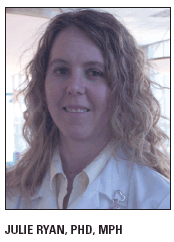Ginger quells chemotherapy-related nausea
ORLANDO-Ginger has been used for years to treat gastrointestinal upset, but for the first time, a large double-blind multicenter randomized study has shown ginger supplements can successfully stem chemotherapy-related nausea, University of Rochester in New York investigators reported at ASCO 2009 (abstract 9511). Some 70% of patients experience nausea and vomiting related to chemotherapy. While vomiting can largely be prevented with anti-emetics, nausea is typically more difficult to prevent and treat.
ORLANDO-Ginger has been used for years to treat gastrointestinal upset, but for the first time, a large double-blind multicenter randomized study has shown ginger supplements can successfully stem chemotherapy-related nausea, University of Rochester in New York investigators reported at ASCO 2009 (abstract 9511). Some 70% of patients experience nausea and vomiting related to chemotherapy. While vomiting can largely be prevented with anti-emetics, nausea is typically more difficult to prevent and treat.

Julie L. Ryan, PhD, MPH, reported the results of the NCI-funded study of 644 patients (two-thirds with breast cancer). Starting three days prior to the first chemotherapy infusion, patients were randomized to receive placebo or ginger in capsule form (0.5 g, 1.0 g, or 1.5 g) divided into two doses daily for six days, plus standard anti-emetics, for two cycles. Patients rated their nausea on a scale of 1 (none) to seven (extreme) at various times of day during the first four days of the treatment cycle.
All doses of ginger significantly reduced nausea, according to the results. The largest reduction occurred with 0.5 g and 1.0 g, amounting to approximately a 40% reduction from baseline nausea in patients receiving these doses (P = .003). Most patients receiving placebo rated nausea a 4-5 while most ginger recipients gave it a rating of 1-2. Nausea diminished significantly over the first 24 hours (P < .001). The duration of ginger’s effect, although not as remarkable, continued for the next couple of days, reported Dr. Ryan, who is an assistant professor of dermatology and radiation oncology.
She noted that 1.0 g of ginger is equal to about a half teaspoon of loose ginger. The investigators believe that the response may be the result of ginger’s potent and direct anti-inflammatory effect on the gastrointestinal tract. It is unknown whether ginger in other forms would have the same effect, she said.
“A reduction in nausea should improve the quality of life of cancer patients during chemotherapy,” Dr. Ryan concluded. Douglas Blayney, MD, ASCO president and medical director at University of Michigan Comprehensive Cancer Center in Ann Arbor, said that “this is interesting information for those patients who often ask their oncologists if there is anything else they can do to deal with this side effect of chemotherapy.”
2 Commerce Drive
Cranbury, NJ 08512
All rights reserved.